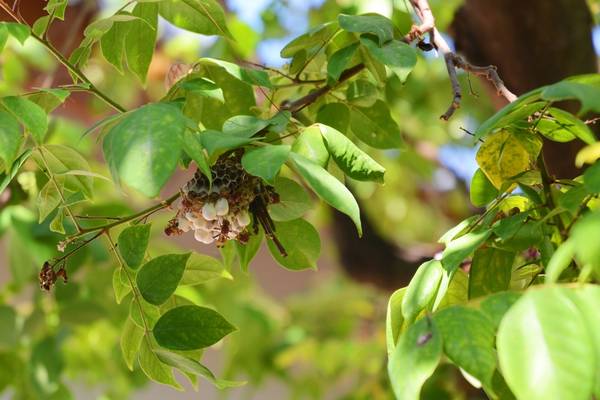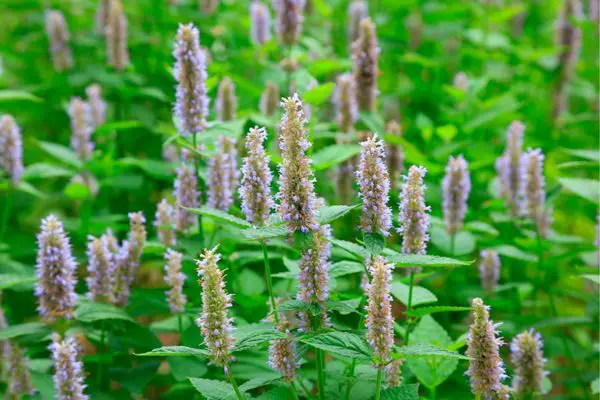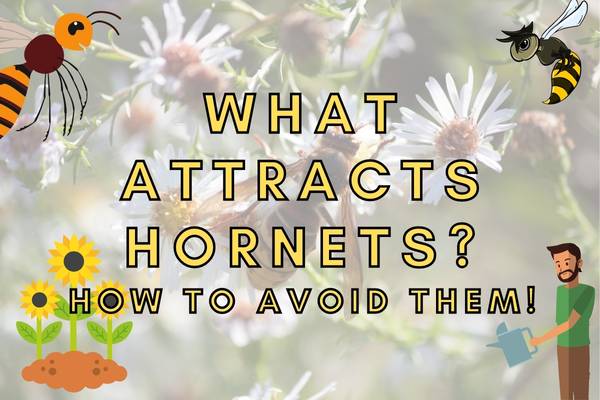Hornets are mainly attracted by food sources. Any property or yard that looks as though it will provide plenty of food will attract hornets. Usually, they build their nests away from your home and mind their own business.
Hornets are primarily attracted to food sources and shelter. As they are insectivores, they will be attracted to yards with lots of insects, but also good water sources. If your yard has many old trees or a shed, this will also be attractive to hornets to build their nests in.
If you’re bothered by hornets hovering around while you’re trying to have a nice backyard afternoon with friends, you might wonder just why they are hanging around you. Hornets aren’t deliberately trying to provoke you.
If they are around, they are attracted by something around you. Understanding their behavior and what they are attracted to is the key to putting more distance between you and them.
Why do I have hornets in my yard?
Hornets are mainly attracted to food sources. They are mainly meat eaters and they eat other animals, so they may be in your yard because they have found a good source of insects or larvae in or near the ground.
However, late in the season, something sweet can also attract them, but mostly because it attracts its favorite prey – insects!

Sweet sources can range from fruit fallen from trees, the sugary juice that aphids secrete, or even drinks or food you may have spilled on your deck.
If you have them in your yard, the queen has found your yard an attractive place for a nest. This isn’t necessarily bad, as hornets prey on some other insects that can cause harm, even mosquitoes.
They also prey on spiders and even other wasp species. Just because they are in your yard it’s not a cause for panic. They can provide a useful service and aren’t anxious to attack you.
Where do hornets build their nests in a yard?
Most hornets prefer tree branches and large shrubs for their nests. They want a place that’s at least partially protected and is unlikely to be bothered. They don’t want their nests close to any kind of activity, and that includes yours.
However, they will sometimes build nests under the eaves of houses or outbuildings. Any abandoned building is a prize, as it provides maximum shelter with minimum interference.

Ground hornets can present a problem, as they are more likely to burrow near your house. Loose soil in your flowerbeds can look attractive as a nesting site for these hornets or yellow jackets that build nests underground.
The problem with ground hornets is that you may step on a nest and aggravate them without even noticing until it’s too late. Pets tend to investigate these things flying out of the ground, with predictable results.
If you are interested, I have written a whole article on hornet nests here!
What are hornets most attracted to?
Hornets are attracted to a wide variety of food sources. Besides other insects, they can be attracted to carrion or garbage. They can often be seen hovering around an open garbage can. Garbage cans contain all kinds of goodies, from leftovers to almost empty soda cans and fast food drink cups.
Pet food left outside is another lure, especially if it is meat-based.
Different species found in US backyards have their own particular preferences. Yellow jackets are often attracted to carrion. It’s not unusual to see a yellow jacket investigating a dead bird, for instance.

Besides food, European hornets often are attracted to light at night, even flying against lit windows. Asian giant hornets also really seem to love tree sap.
If you live in an area that has them, it would be a good idea to use a sealing spray for tree wounds any time you prune trees or bushes to prevent sap leakage.
Eliminating potential attractants is a good way to discourage hornets. Keeping your garbage cans covered firmly will keep the scent from wafting around and attracting hornets.
Teach your kids not to leave any drink cups or cans outside. Pick up any fruit that falls from your trees or bushes that you won’t eat and dispose of it. Even inedible fruit produced by some bushes is attractive to hornets.
If you have any pets that you feed outside, don’t leave the leftovers outside. Leaving dry food outside all day will attract all sorts of pests, including gophers, raccoons, and groundhogs to your yard!
What smell keeps hornets away
Mint, cinnamon, limonene and cloves are all scents that deter hornets and other wasps. Peppermint is one smell that they just hate. You can eliminate any gathering places by soaking a cotton ball in peppermint oil and placing it near the site.
Put a few drops of the oil in a water-filled spray bottle to spray suspect areas. You do need to use these oils with caution if you have pets, as they will smell extremely strongly to most pets, especially dogs, which they will find very uncomfortable. But this is after all why it works as a repellant for most animals.

Mint plants can be a better choice. You can plant mint around your house and in your garden to discourage hornets. Even potted mint plants can have the same effect if you need a deterrent near a doorway or other place where it’s not feasible to plant them.
They can also be moved if a new hornet gathering place is discovered. The beauty of the plants is that they won’t negatively affect your pets.
How do I get rid of hornets in my yard?
Hornets can be a plague to have in your backyard and they can be dangerous to children and pets too.
The best way to get rid of hornets is to get rid of their nest, but you can also keep them away for a while without actually dealing with the nest itself.
The best way to prevent hornets from establishing in your yard is to eliminate their food and shelter sources. Keep your garbage cans covered and pick up any fallen fruit from trees or bushes.
Don’t leave pet food outside, and teach your kids not to leave drink cups or cans around. You can also plant mint plants around your house and garden to deter hornets.
If you have a ground hornet problem, you can try sealing their nests with a mixture of soapy water and cayenne pepper.
And although a pretty hornet’s nest can bring in a significant amount of cash and the hornets can play a somewhat beneficial role in the ecosystem, they are mostly just destructive as they kill honey bees and disrupt natural pollination cycles.
Insecticide sprays are the preferred solution and come in eco-friendly natural forms as well. However, the synthetic ones are still the most effective ones for killing the hornets and yellow jackets but should be used only outdoors and with care.
Use insecticide sprays
The most effective way to kill hornets in your backyard is by spraying the nest. The best time to apply a hornet killer is at night, when it is dark. Apply the spray at the entrance of the nest and let it stay there for six to eight seconds.
Most sprays can reach up to 20 feet away so you do not have to worry about getting too close to the hornet or yellow jacket nest itself.
You can also make your own insecticide spray using a strong ammonia solution or essential oils mixed with soap and water. These are, however, not as effective as the commercially available sprays, but will work for minor infestations.
While the ammonia spray is effective in killing ground hornets, this solution is best applied after dark. Be sure to cover the mound when you pour the liquid. Repeat the application as needed. Another method is to use essential oils on the mounds.
Natural essential oils can also help to kill and keep hornets away. Essential oils can be mixed with two cups of water in a spray bottle so that you can spray the area where ground hornets are active. If the hornets are breeding in sparse patches, it is recommended to seed those areas with the spray as well.
Ultrasonic repellants
While this strategy will not actually kill the hornets, it will help to keep them away from your house or property. As a bonus, it also helps keep other pests away like mice, rats, mosquitos, as well as gophers and groundhogs (if placed outside).
They work via sounds so high frequency that you cannot hear them, but most insects and pests can! Placing one in your house will make sure that no hornets or wasps establish their nests there.
They also come in solar-powered versions for your backyard to keep hornets and wasps away from certain locations like your vegetable garden.
Use hornet traps
If you want to keep hornets away without using strong synthetic chemicals, there are also a few solutions such as traps or decoys.
Another effective method is to trap the hornets yourself with a homemade trap. You can make a trap out of a plastic 2-liter soda bottle, and place canned cat food or ripe fruit near the nest.
You can also put an empty can or lid near the nest. If you do decide to use a trap, you should keep your pet and other animals away from it as the dead hornets can still sting and are dangerous to touch.
Use nest decoys
You can also hang a paper bag in the back of your yard to keep the hornets away from your house (they will think it’s their nest!).
Also, a good way to prevent hornets from establishing on your property is to keep your yard neat and tidy by trimming back bushes and plants, and don’t place flowers near doors or pathways.
Also, be sure to cover trash cans and keep them closed. If you are allergic to hornets, you may want to hire a professional hornet removal service.
However, always be on the safe side! If you are allergic to wasp stings, you should seek professional help for the nest removal.
If you are not allergic, you can follow these tips to get rid of hornets in your backyard but remember to avoid disrupting the nest too much because it releases pheromones that trigger other wasps to perceive you as a threat.
Conclusion
Hornets can be a nuisance if they build their nests near your home, but they can also be beneficial because they prey on other insects.
Hornets are attracted to food and shelter sources. Eliminating their potential attractants is the best way to get rid of them.
Keep your garbage cans covered, pick up fallen fruit, and don’t leave pet food or drink cups outside. You can also plant mint plants around your house and garden to deter hornets.










